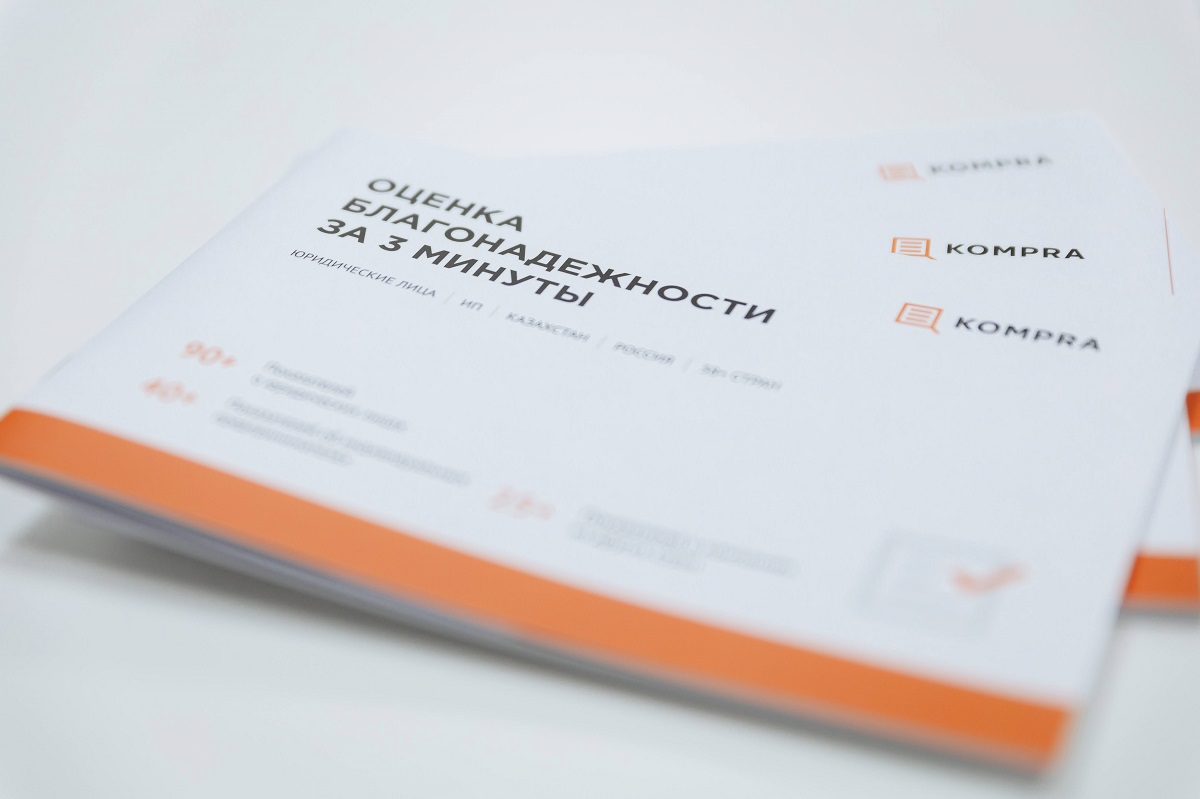Discover the initial challenges confronted by the service and its current development in the interview featuring co-founder Askhat Sergazin and Kompra’s CEO Aidar Zhubandykov, presented as part of the collaborative effort with Astana Hub in “100 Startup Stories of Kazakhstan”.
The initial iteration of Kompra was offered for free because we were unsure about how much to charge for the service
— In an interview with Digital Business last year, Dauren Tulebavev mentioned that the Kompra project began under the umbrella of the Kazdream holding. Please provide insights into how it commenced.
Askhat: — Indeed, it is accurate. I became a part of Kazdream in 2016. Back then, the company primarily concentrated on projects within the B2G sector. Subsequently, we began contemplating ventures in the B2B realm to enhance the stability of our business. Overall, there existed a strong aspiration to develop new services tailored specifically for entrepreneurs and individuals.
By the summer of 2017, this aspiration materialized into the establishment of the Kompra startup. We assembled a small team and launched the beta version in September 2017. For an extended period, Kazdream did not reveal its affiliation with the project: senior managers aimed to assess whether Kompra could grow and generate revenue autonomously.
I vividly recall this period: coming from a B2G background, we began delving into the fundamentals of operating in the B2B sector. We embarked on customer development, product development, sales, and contemplated the business model from an entirely different perspective.
However, the initial studies conducted by our team unveiled a significant demand, not from businesses as we had previously assumed, but from quasi-state sector companies. It became apparent that they encountered difficulties while conducting tenders and procurement, requiring them to assess numerous potential suppliers and partners. Manually gathering all this data was incredibly time-consuming. This posed a major challenge, leading us to concentrate on that niche at the time.

— Hence, are you and Dauren Tulebaev the two founders of Kompra?
— Correct.
— What happened next?
— Once it became evident that clients required verification of potential partners in Kazakhstan and we could capitalize on this, we sought to enhance our knowledge through several incubators and accelerators. We participated in various programs at Astana Hub and Nazarbayev University, enabling us to grasp the importance of working swiftly and testing hypotheses.
Thanks to these programs, we swiftly resolved to launch the product, despite it being far from ideal. Initially, our aim was to gather 30-50 key indicators about companies for the first version of the service. However, the process of connecting to databases providing such information and integrating them would have consumed a substantial amount of time. As a result, Kompra was launched with 15 basic indicators, much quicker than anticipated.
The initial beta version was offered for free because we were unsure about how much to charge for the service.
«In the initial year, we experienced a contraction in sales, primarily attributed to the nuances of the B2G market»
— You mentioned that during the launch, Kazdream deliberately distanced itself from the project to assess whether Kompra could thrive independently. From where did you secure funds to initiate the project?
— We didn’t have a fixed budget. Some funds came from Kazdream, and certain expenses were covered through our participation in acceleration programs. For instance, we managed to resolve the office space issue with the assistance of Astana Hub, securing a place in their coworking space at no cost.
However, in the initial year and a half, our expenses primarily consisted of salaries for a small team and business trips across Kazakhstan to negotiate with our first clients. The total amount averaged around 2-2.5 million tenge per month.

— What constituted the primary challenge at the onset of the startup?
— The main challenge involved challenging negotiations with companies in the quasi-state sector. Notably, one of our key clients within this sector encompassed security and legal functions. Initially, they were not keen on our product. While they comprehended the value of Kompra, their management failed to recognize the necessity of allocating extra funds when verification could be done manually. I frequently encountered statements from the security function such as, “Our management questioned why we sought a budget for IT services. You have two or three people, so handle this work internally.”
The initial contract was executed in March 2018, initiated by a client who had been collaborating with us from the outset and had tested the initial prototypes of the service. The company procured an annual subscription for 450,000 tenge. This transaction provided a modest impetus and facilitated negotiations with other prospective partners. However, we encountered another obstacle: hardly anyone had allocated funds for Kompra that year. As a matter of fact, we secured agreements for 2019.

As a result of these challenging negotiations, we observed a decline in sales during the first year. Our saving grace came from individual transactions with private companies.
— At what point did Kompra achieve self-sufficiency?
— After October 2018, in collaboration with the first CEO of the project, Rinata Ilyubaeva, we began to secure an increasing number of contracts with private companies. We also obtained our initial subscriptions from representatives of the quasi-state sector for 2019. Additionally, at that juncture, I recognized another benefit stemming from the acceleration programs at Astana Hub and other platforms. During negotiations, I hesitated to request substantial amounts from companies. I was apprehensive about quoting subscription fees of 200-300 thousand tenge. However, mentors emphasized that if I aimed to test Kompra’s potential, I should not be afraid and should even ask for more. This approach proved effective: we eventually started selling the service for 700,000 and even 1 million tenge. Surprisingly, the customers exhibited no resistance and did not request discounts. My fears were solely internal, and if the client perceived the value, they were willing to allocate significantly larger budgets.
«Kompra assisted in uncovering instances of illicit procurements within a business employing 30 thousand individuals»
— What constituted the framework of your competitors? Were there comparable services that also verified counterparts?
Aidar: — Several services from Russia were present in the market, such as Spark and Kontur.Focus. However, they did not furnish comprehensive details about Kazakhstani companies. This was our primary advantage at the time, as it was crucial to concentrate on local state databases to obtain the most comprehensive business profiles.

Hence, as Kompra began to generate more revenue than expenses, we initiated the development of additional features. Some of these enhancements were driven by market demands. Notably, feedback indicated that companies perceived the highest risks when engaging with small entrepreneurs. In response to such comments, we swiftly updated our services to provide more comprehensive information about private entrepreneurs.
Likewise, Kompra introduced the capability to identify affiliates within companies. As we received a positive response from the market, we accelerated our product development and concentrated on meeting specific requests. Our startup emerged as one of the pioneering companies to establish connections with numerous databases of the Ministry of Digital Development, Innovation, and Aerospace Industry, further enhancing the value provided to our clients.
— I believe that the current landscape has evolved, with the emergence of other services that utilize the same databases. Can you please elaborate on how you differentiate yourselves from these services?
Aidar: — That is correct. However, our current value does not solely lie in the databases from which we extract information. It resides in our analytics modules. Presently, no one is inclined to receive raw data and spend significant time deciphering it.
Providing clients with readily available information is paramount. Clients seek to access ten key indicators of a company, including tax reports, debts, and penalties. This significantly simplifies the processes for both corporations and SMEs.

— Can you provide an example of such an algorithm?
Aidar: — A prime illustration is the Internal Check module, which was created at the request of a particular client. This client is a large company in Kazakhstan with a workforce of 30,000 individuals spread throughout the country. The company operates from its central office and numerous branches. Each branch conducts its own procurements and tenders, making tracking a challenging task. Consequently, some local managers began registering legal entities under their own names and those of their family members to facilitate supplies through these entities.

To address this issue, we designed a dedicated tool for cross-referencing all employees and their family members on one side, and, on the other, to verify the legal entities that were engaged with this company. Once this tool became operational, it revealed a multitude of illicit connections. It became evident that such analytics was beneficial for other companies as well.
Another instance is the module developed for the Tech Orda program by Astana Hub. This program is designed to train IT specialists using government-issued vouchers for educational purposes. For this group, we created a module to examine the company’s history. This facilitated an understanding of the IT school’s establishment date, the owner’s association with Astana Hub, and the presence of actual revenue and profit.
«The service offers information not only for Kazakhstan but also for 25 other countries»
— What is the current status of Kompra?
Aidar: — The client structure in Kazakhstan is evolving. Alongside businesses and the quasi-state sector, individuals are now seeking to verify their potential partners and contractors. Essentially, people desire a deeper understanding of the individuals from whom they purchase furniture or kitchen. It is more convenient for them to pay 500 tenge for a single check than to spend years addressing issues related to poor work quality or fraud.
Presently, our client structure is distributed as follows: 60% for B2G, 30% for B2B, and 10% for B2C. I anticipate that in the upcoming year, the portion for businesses and individuals will expand.

Regarding the service, we have collaborated with the Financial Monitoring Agency for six months. In partnership, we established a Telegram bot that verifies whether a company is listed in Kazakhstan’s pyramid schemes or if any ongoing investigations are underway.
We are also expanding our service for export purposes. Numerous Kazakhstan companies engage with foreign legal entities and seek comprehensive information about them. Consequently, Kompra partners with other international platforms. Presently, we can furnish information about companies from 25 countries. Alongside the CIS, this encompasses Georgia, the UAE, Turkey, Estonia, Cyprus, the UK, the Isle of Man, and the Faroe Islands.
Recently, Kompra ventured into the Uzbekistan market. The country is heavily investing in the development of IT and entrepreneurship, signifying that the demand for such services will continue to escalate.

— What are your upcoming plans?
Aidar: — Our aim is to integrate China into our service. We have observed an increasing trend among our businessmen engaging with Chinese legal entities, yet obtaining information about them is notably challenging due to the country’s closed nature.
Given our intention to expand into international markets, it is imperative to make the platform multilingual. These are our primary objectives for the immediate future.
Discover the initial challenges confronted by the service and its current development in the interview featuring co-founder Askhat Sergazin and Kompra’s CEO Aidar Zhubandykov, presented as part of the collaborative effort with Astana Hub in “100 Startup Stories of Kazakhstan”.
The initial iteration of Kompra was offered for free because we were unsure about how much to charge for the service
— In an interview with Digital Business last year, Dauren Tulebavev mentioned that the Kompra project began under the umbrella of the Kazdream holding. Please provide insights into how it commenced.
Askhat: — Indeed, it is accurate. I became a part of Kazdream in 2016. Back then, the company primarily concentrated on projects within the B2G sector. Subsequently, we began contemplating ventures in the B2B realm to enhance the stability of our business. Overall, there existed a strong aspiration to develop new services tailored specifically for entrepreneurs and individuals.
By the summer of 2017, this aspiration materialized into the establishment of the Kompra startup. We assembled a small team and launched the beta version in September 2017. For an extended period, Kazdream did not reveal its affiliation with the project: senior managers aimed to assess whether Kompra could grow and generate revenue autonomously.
I vividly recall this period: coming from a B2G background, we began delving into the fundamentals of operating in the B2B sector. We embarked on customer development, product development, sales, and contemplated the business model from an entirely different perspective.
However, the initial studies conducted by our team unveiled a significant demand, not from businesses as we had previously assumed, but from quasi-state sector companies. It became apparent that they encountered difficulties while conducting tenders and procurement, requiring them to assess numerous potential suppliers and partners. Manually gathering all this data was incredibly time-consuming. This posed a major challenge, leading us to concentrate on that niche at the time.

— Hence, are you and Dauren Tulebaev the two founders of Kompra?
— Correct.
— What happened next?
— Once it became evident that clients required verification of potential partners in Kazakhstan and we could capitalize on this, we sought to enhance our knowledge through several incubators and accelerators. We participated in various programs at Astana Hub and Nazarbayev University, enabling us to grasp the importance of working swiftly and testing hypotheses.
Thanks to these programs, we swiftly resolved to launch the product, despite it being far from ideal. Initially, our aim was to gather 30-50 key indicators about companies for the first version of the service. However, the process of connecting to databases providing such information and integrating them would have consumed a substantial amount of time. As a result, Kompra was launched with 15 basic indicators, much quicker than anticipated.
The initial beta version was offered for free because we were unsure about how much to charge for the service.
«In the initial year, we experienced a contraction in sales, primarily attributed to the nuances of the B2G market»
— You mentioned that during the launch, Kazdream deliberately distanced itself from the project to assess whether Kompra could thrive independently. From where did you secure funds to initiate the project?
— We didn’t have a fixed budget. Some funds came from Kazdream, and certain expenses were covered through our participation in acceleration programs. For instance, we managed to resolve the office space issue with the assistance of Astana Hub, securing a place in their coworking space at no cost.
However, in the initial year and a half, our expenses primarily consisted of salaries for a small team and business trips across Kazakhstan to negotiate with our first clients. The total amount averaged around 2-2.5 million tenge per month.

— What constituted the primary challenge at the onset of the startup?
— The main challenge involved challenging negotiations with companies in the quasi-state sector. Notably, one of our key clients within this sector encompassed security and legal functions. Initially, they were not keen on our product. While they comprehended the value of Kompra, their management failed to recognize the necessity of allocating extra funds when verification could be done manually. I frequently encountered statements from the security function such as, “Our management questioned why we sought a budget for IT services. You have two or three people, so handle this work internally.”
The initial contract was executed in March 2018, initiated by a client who had been collaborating with us from the outset and had tested the initial prototypes of the service. The company procured an annual subscription for 450,000 tenge. This transaction provided a modest impetus and facilitated negotiations with other prospective partners. However, we encountered another obstacle: hardly anyone had allocated funds for Kompra that year. As a matter of fact, we secured agreements for 2019.

As a result of these challenging negotiations, we observed a decline in sales during the first year. Our saving grace came from individual transactions with private companies.
— At what point did Kompra achieve self-sufficiency?
— After October 2018, in collaboration with the first CEO of the project, Rinata Ilyubaeva, we began to secure an increasing number of contracts with private companies. We also obtained our initial subscriptions from representatives of the quasi-state sector for 2019. Additionally, at that juncture, I recognized another benefit stemming from the acceleration programs at Astana Hub and other platforms. During negotiations, I hesitated to request substantial amounts from companies. I was apprehensive about quoting subscription fees of 200-300 thousand tenge. However, mentors emphasized that if I aimed to test Kompra’s potential, I should not be afraid and should even ask for more. This approach proved effective: we eventually started selling the service for 700,000 and even 1 million tenge. Surprisingly, the customers exhibited no resistance and did not request discounts. My fears were solely internal, and if the client perceived the value, they were willing to allocate significantly larger budgets.
«Kompra assisted in uncovering instances of illicit procurements within a business employing 30 thousand individuals»
— What constituted the framework of your competitors? Were there comparable services that also verified counterparts?
Aidar: — Several services from Russia were present in the market, such as Spark and Kontur.Focus. However, they did not furnish comprehensive details about Kazakhstani companies. This was our primary advantage at the time, as it was crucial to concentrate on local state databases to obtain the most comprehensive business profiles.

Hence, as Kompra began to generate more revenue than expenses, we initiated the development of additional features. Some of these enhancements were driven by market demands. Notably, feedback indicated that companies perceived the highest risks when engaging with small entrepreneurs. In response to such comments, we swiftly updated our services to provide more comprehensive information about private entrepreneurs.
Likewise, Kompra introduced the capability to identify affiliates within companies. As we received a positive response from the market, we accelerated our product development and concentrated on meeting specific requests. Our startup emerged as one of the pioneering companies to establish connections with numerous databases of the Ministry of Digital Development, Innovation, and Aerospace Industry, further enhancing the value provided to our clients.
— I believe that the current landscape has evolved, with the emergence of other services that utilize the same databases. Can you please elaborate on how you differentiate yourselves from these services?
Aidar: — That is correct. However, our current value does not solely lie in the databases from which we extract information. It resides in our analytics modules. Presently, no one is inclined to receive raw data and spend significant time deciphering it.
Providing clients with readily available information is paramount. Clients seek to access ten key indicators of a company, including tax reports, debts, and penalties. This significantly simplifies the processes for both corporations and SMEs.

— Can you provide an example of such an algorithm?
Aidar: — A prime illustration is the Internal Check module, which was created at the request of a particular client. This client is a large company in Kazakhstan with a workforce of 30,000 individuals spread throughout the country. The company operates from its central office and numerous branches. Each branch conducts its own procurements and tenders, making tracking a challenging task. Consequently, some local managers began registering legal entities under their own names and those of their family members to facilitate supplies through these entities.

To address this issue, we designed a dedicated tool for cross-referencing all employees and their family members on one side, and, on the other, to verify the legal entities that were engaged with this company. Once this tool became operational, it revealed a multitude of illicit connections. It became evident that such analytics was beneficial for other companies as well.
Another instance is the module developed for the Tech Orda program by Astana Hub. This program is designed to train IT specialists using government-issued vouchers for educational purposes. For this group, we created a module to examine the company’s history. This facilitated an understanding of the IT school’s establishment date, the owner’s association with Astana Hub, and the presence of actual revenue and profit.
«The service offers information not only for Kazakhstan but also for 25 other countries»
— What is the current status of Kompra?
Aidar: — The client structure in Kazakhstan is evolving. Alongside businesses and the quasi-state sector, individuals are now seeking to verify their potential partners and contractors. Essentially, people desire a deeper understanding of the individuals from whom they purchase furniture or kitchen. It is more convenient for them to pay 500 tenge for a single check than to spend years addressing issues related to poor work quality or fraud.
Presently, our client structure is distributed as follows: 60% for B2G, 30% for B2B, and 10% for B2C. I anticipate that in the upcoming year, the portion for businesses and individuals will expand.

Regarding the service, we have collaborated with the Financial Monitoring Agency for six months. In partnership, we established a Telegram bot that verifies whether a company is listed in Kazakhstan’s pyramid schemes or if any ongoing investigations are underway.
We are also expanding our service for export purposes. Numerous Kazakhstan companies engage with foreign legal entities and seek comprehensive information about them. Consequently, Kompra partners with other international platforms. Presently, we can furnish information about companies from 25 countries. Alongside the CIS, this encompasses Georgia, the UAE, Turkey, Estonia, Cyprus, the UK, the Isle of Man, and the Faroe Islands.
Recently, Kompra ventured into the Uzbekistan market. The country is heavily investing in the development of IT and entrepreneurship, signifying that the demand for such services will continue to escalate.

— What are your upcoming plans?
Aidar: — Our aim is to integrate China into our service. We have observed an increasing trend among our businessmen engaging with Chinese legal entities, yet obtaining information about them is notably challenging due to the country’s closed nature.
Given our intention to expand into international markets, it is imperative to make the platform multilingual. These are our primary objectives for the immediate future.








